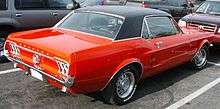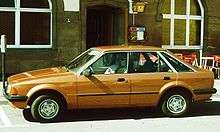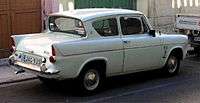Notchback


Notchback is a styling term describing a car body style, a variation of three-box styling where the third distinct volume or "box" is less pronounced — especially where the rear deck (third box) is short or where the rear window is upright. Generally, the notchback refers to the distinct angle of the rear window in relation to the vehicle's more horizontal roofline and its rear decklid.
The term is derived from the noun, notch meaning v-cut or indentation — though as a styling term it eludes precise definition and can overlap other styling designations. The term can apply to a sedan, coupé, liftback or hatchback configuration — especially where the third box of the three-box styling remains articulated, though perhaps barely — as with the third generation European Ford Escort. Notchback may highlight a design's sharp or abrupt roof/rear-window angle. Examples include the European Ford Anglia and U.S. Mercury Montclair that also included a rear window that could be lowered for "breezeway" ventilation.[1]
The styling term also may overlap the marketing use of the term notchback, for example where the term differentiates models within a range, for example the Chevrolet Vega Notchback (sedan) from the Vega Hatchback. The compact Ford Mustang although labeled a hardtop coupe, exhibited "long hood - short deck" notchback styling that was common on 1960s compact coupes.
North America

General Motors claims that the 1940 Cadillac Sixty Special introduced the "streamlined notchback" styling that influenced roof and rear deck styling of a broad range of vehicles until World War II[2] The notchback design was common across U.S. automakers and automobile types starting in the early-1960s.
American Motors described the a styling trend re-emerged in the late-1960s as a "modified fastback" where the roof lines on two-door models were made smoother with a slope of the rear window or having more of an arc. The four-door sedans featured a more upright roofline such as the Rambler Ambassador.[3]
Chevrolet used the notchback descriptor on the Chevrolet Vega two-door thin-pillar sedan, officially changing its name for the 1973 model year to - Vega Notchback.[4]
Oldsmobile used the so-called "formal roof" styling on the 1970 Cutlass Supreme hardtop coupe described in marketing literature as having "promised affordable elegance".[5]
In the 1980s, short deck - formal roof, compact and mid-size notchback coupes and sedans made a return such as the Ford LTD Crown Victoria, as well as the C- and G-body cars from General Motors, and the 1985-1991 N-body cars.
Examples
- 1958-1974 AMC Ambassador sedans
- 1964-1967 GM A-body coupes/sedans (Chevelle, Tempest/LeMans, Skylark, F-85/Cutlass)
- 1965-1973 Ford Mustang coupe
- 1967-1969 Chevrolet Camaro coupe
- 1967-1969 Pontiac Firebird coupe
- 1968-1977 Chevrolet Corvette coupe
- 1971-1977 Chevrolet Vega notchback
- 1974-1978 Ford Mustang II coupe[6]
- 1975-1980 Chevrolet Monza Towne Coupe
- 1975-1977 Pontiac Astre notchback
- 1976-1980 Pontiac Sunbird coupe
- 1976-1985 Chevrolet Impala sedan
- 1976-1989 Dodge Diplomat sedan
- 1978-1983 Chevrolet Malibu sedan
- 1978-1991 Ford LTD Crown Victoria sedan
- 1979-1993 Ford Mustang coupe
- 1980-1985 GM X body coupe/sedan Citation coupe (80-82), Phoenix, Skylark, Omega
- 1981-1987 J body coupes/sedans Cavalier, Sunbird, Skylark, Firenza, Cimarron
- 1981-1987 GM RWD G-body coupes/sedans (Malibu/Monte Carlo, LeMans/Bonneville/Grand Prix, Regal, Cutlass)
- 1983-1997 Mercury Cougar
- 1984-1988 Pontiac Fiero
- 1985-1988 Chevrolet Nova sedan
- 1987-1992 Cadillac Brougham
- 1991-2011 Ford Crown Victoria and Ford Crown Victoria Police Interceptor
Outside North America


The term became common in British English when used for the European Mark III Ford Escort and the slightly later Ford Sierra, both of which have hatchbacks as well as a slightly articulated trunk.
In British English a three-box sedan[7] is more generally known as a saloon.[8] Although the term appears in a few British English publications (see refs), "notchback" is not a term that is used in common parlance in Britain.[9][10]
Examples
- Citroen Ami 6
- Citroen Xantia
- Citroen Xsara
- Ford Anglia
- Ford Mondeo
- Lexus LS
- Mercedes-Benz W108, W109
- Nissan Cefiro
- Nissan Laurel
- Opel Omega
- Opel Vectra
- Renault Laguna
- Renault Safrane
- Smart Roadster
- Volkswagen Jetta
- Volkswagen Notchback
- ZAZ-966 Zaporozhets
- Saab 900
- Maruti Swift Dzire
- Tata Zest
- Proton Saga
- Hyundai Xcent
- Toyota Etios
- Honda Amaze
Gallery
-

1984 Pontiac Fiero Coupe
-

1960s Ford Anglia notchback with a reverse-rake rear window.
-

European Ford Orion was the notchback version of the Escort
-

European Ford Sierra Mark II notchback
-
.jpg)
European Ford Sierra Mark I hatchback
See also
References
- ↑ "Mercury's breezeway design (advertisement)". Life. 54 (6): 89. 8 February 1963. Retrieved 15 February 2013.
- ↑ "1940, The Cadillac Sixty Sets Another Styling Trend". General Motors: Generations of GM Wiki Timeline. Retrieved 15 February 2013.
- ↑ Auto Editors of Consumer Guide (11 October 2007). "1967-1968 AMC Ambassador". howstuffworks com. Retrieved 15 February 2013.
- ↑ 1971-77 Chevrolet Vega brochures
- ↑ Auto Editors of Consumer Guide (20 August 2007). "Oldsmobile's 1973-1977 Intermediates". howstuffworks com. Retrieved 15 February 2013.
- ↑ Auto Editors of Consumer Guide (15 February 2007). "The 1974 Ford Mustang: Notchback by Default". howstuffworks com. Retrieved 15 February 2013.
- ↑ Chambers Dictionary (British English): sedan Retrieved 2008-05-22.
- ↑ Chambers Dictionary (British English): saloon Retrieved 2008-05-22.
- ↑ Concise Oxford English Dictionary (Eleventh ed.). Oxford University Press. 2006. p. 977. ISBN 0-19-929634-0.
a car with a back that extends approximately horizontally from the bottom of the rear window so as to make a distinct angle with it
- ↑ Barnard, R.H. (1996). Road Vehicle Aerodynamic Design. Longman. ISBN 978-0-582-24522-8.